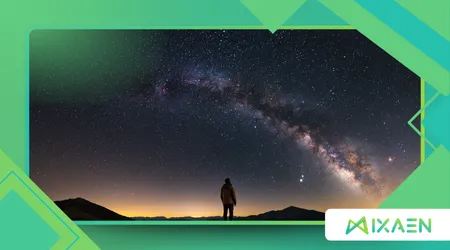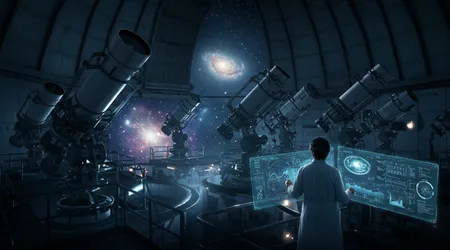The Philosophy of Cosmology: What Does the Universe Tell Us?

The Philosophy of Cosmology invites us to ponder the universe’s deepest mysteries, blending science with existential questions.
Anúncios
What does the cosmos reveal about our existence? This field merges rigorous scientific inquiry with profound philosophical reflection, challenging us to explore reality’s nature.
From ancient musings to modern cosmology, it probes the universe’s origin, structure, and purpose. This article delves into how The Philosophy of Cosmology shapes our understanding, weaving together scientific discoveries, metaphysical debates, and human curiosity.
Let’s embark on a journey to uncover what the cosmos whispers about our place in its vast expanse.
The universe, vast and enigmatic, has long captivated human imagination. Philosophers and scientists alike grapple with its implications, seeking meaning beyond empirical data.
The Philosophy of Cosmology offers a lens to interpret cosmic phenomena, bridging observable facts with abstract reasoning. It asks: Why does the universe exist at all?
This question drives both theoretical physics and metaphysical inquiry, urging us to confront reality’s fundamental nature.
Recent advancements, like the James Webb Space Telescope’s 2022 images, deepen these reflections, revealing galaxies formed just 200 million years after the Big Bang.
Cosmology’s philosophical roots trace back to ancient thinkers like Aristotle, who envisioned a purposeful cosmos. Today, The Philosophy of Cosmology evolves with scientific breakthroughs, yet retains its core question: What is the universe’s ultimate significance?
It challenges reductionist views, encouraging holistic perspectives that integrate physics, metaphysics, and ethics. For instance, the fine-tuning argument where physical constants seem perfectly calibrated for life sparks debates about cosmic purpose.
Is this precision a coincidence, or does it hint at deeper truths? The cosmos beckons us to explore these enigmas with open minds.
The Intersection of Science and Metaphysics
Cosmology’s scientific advances fuel philosophical inquiry. The Big Bang theory, supported by cosmic microwave background radiation, suggests a universe with a definite beginning.
The Philosophy of Cosmology probes what preceded this event. Was there a “before”? Quantum cosmology, exploring multiverse theories, complicates these questions.
For example, the Many Worlds Interpretation posits infinite parallel universes, each with distinct physical laws. This challenges our notions of uniqueness and causality, pushing philosophy to redefine reality itself.
Imagine a library where every book represents a possible universe. Each page, a unique configuration of physical laws, tells a different story.
++ Can the Universe Be a Living Being?
The Philosophy of Cosmology asks: Are we in the only story, or one of countless narratives? This analogy highlights the multiverse’s philosophical weight.
While science measures cosmic expansion, philosophy questions its implications for free will and existence.
A 2023 study in Nature found the universe’s expansion rate (Hubble constant) at 73.4 km/s/Mpc, raising questions about cosmic consistency and our interpretive frameworks.
| Cosmic Parameter | Value | Implication |
|---|---|---|
| Hubble Constant | 73.4 km/s/Mpc | Suggests accelerating universe expansion, challenging standard models. |
| Cosmic Microwave Background | 2.7 K | Evidence of Big Bang, informing origin theories. |
| Dark Energy Percentage | ~68% | Drives expansion, raising questions about cosmic purpose. |
Philosophical cosmology doesn’t just interpret data; it questions science’s limits. Can empirical methods fully explain existence?
Quantum entanglement, where particles influence each other instantly across vast distances, defies classical causality.
Read more: What If We Are the Universe Observing Itself?
This phenomenon prompts The Philosophy of Cosmology to explore non-materialist perspectives, like panpsychism, which posits consciousness as a fundamental cosmic feature.
Such ideas, while speculative, enrich our dialogue with the universe, urging us to consider reality beyond observable metrics.
The Fine-Tuning Puzzle

The universe’s apparent fine-tuning fascinates philosophers and scientists. Physical constants, like gravity’s strength, seem precisely set to allow life. A slight variation could render stars or planets impossible.
The Philosophy of Cosmology grapples with this precision: Is it chance, necessity, or design? The anthropic principle suggests we observe a life-friendly universe because we exist to observe it. Yet, this tautology leaves deeper questions unanswered, fueling debates about cosmic intentionality.
Consider a watchmaker crafting a timepiece with gears perfectly aligned. If one gear shifts slightly, the watch fails. The universe’s constants resemble this delicate mechanism.
Also read: The Role of Observer in Quantum Mechanics
The Philosophy of Cosmology asks: Who or what set these gears? Multiverse theories propose countless universes with varying constants, ours being one that supports life.
Critics argue this sidesteps the question, while others see it as a plausible explanation. The debate underscores cosmology’s philosophical depth, blending empirical rigor with existential wonder.
Fine-tuning also raises ethical questions. If the universe is uniquely suited for life, does this impose responsibilities on us? Philosophical cosmology explores how cosmic order informs human purpose.
For instance, environmental ethics draws parallels between cosmic balance and Earth’s ecosystems, urging sustainable living.
A 2024 survey by Pew Research found 62% of Americans believe humanity has a unique role in the cosmos, reflecting how fine-tuning shapes cultural narratives and personal beliefs.
Cosmology and Human Existence
The cosmos isn’t just a scientific subject; it’s a mirror for human identity. The Philosophy of Cosmology examines how cosmic discoveries shape our self-understanding. The Copernican revolution displaced Earth from the universe’s center, challenging anthropocentric views.
Today, exoplanet discoveries over 5,000 confirmed by 2025 prompt questions about life’s uniqueness. Are we alone, or part of a cosmic community? These questions redefine humanity’s place in the grand scheme.
Picture a lone astronaut gazing at Earth from space, a fragile blue dot. This perspective, often called the “overview effect,” transforms one’s worldview.
The Philosophy of Cosmology harnesses this awe to explore existential meaning. It asks: Does the universe’s vastness diminish us, or elevate our significance?
Philosophers like Sartre argued existence precedes essence, but cosmology suggests the universe’s structure might inform our purpose, blending freedom with cosmic context.
Cosmological insights also influence art and culture. Films like Interstellar (2014) draw from black hole physics to explore human survival and love’s transcendence.
Philosophical cosmology bridges these narratives with science, asking how cosmic truths shape human values.
As we uncover the universe’s secrets, from dark matter to gravitational waves, we confront our role in an ever-expanding reality, urging humility and curiosity in equal measure.
The Future of Philosophical Cosmology
As technology advances, The Philosophy of Cosmology faces new frontiers. Artificial intelligence, like neural networks analyzing cosmic data, accelerates discoveries. But can machines grasp the universe’s philosophical implications?
Human intuition remains vital, weaving empirical data with existential questions. Upcoming missions, like the 2027 Simons Observatory, aim to refine our understanding of cosmic inflation, potentially reshaping philosophical debates about the universe’s origin.
The interplay of science and philosophy will deepen as we probe dark energy, which constitutes 68% of the universe’s energy.
This mysterious force challenges materialist assumptions, inviting speculative theories like emergent spacetime.
Philosophical cosmology will explore whether reality is fundamentally relational, not absolute. Such ideas could redefine existence, suggesting the universe is less a machine than a dynamic web of interactions, alive with possibility.
Engaging with these questions requires interdisciplinary courage. Philosophers must collaborate with physicists, ethicists, and artists to fully grasp the cosmos’s message.
What stories will the universe tell us next? As we stand on the cusp of new discoveries, The Philosophy of Cosmology reminds us to listen closely, blending reason with wonder to uncover truths that resonate across time and space.
Conclusion
The Philosophy of Cosmology is more than an academic pursuit; it’s a quest for meaning in an infinite cosmos. It challenges us to weave science and philosophy into a coherent narrative, asking what the universe reveals about our existence.
From fine-tuning to multiverse theories, it pushes boundaries, urging us to rethink reality. As we gaze at the stars, we confront our own significance, finding purpose in the cosmos’s vastness.
Let’s continue this journey, embracing the unknown with curiosity and wisdom, forever seeking the universe’s deeper truths.
Frequently Asked Questions
What is The Philosophy of Cosmology?
It’s an interdisciplinary field combining cosmology’s scientific study of the universe with philosophical inquiry into its origin, structure, and meaning.
How does fine-tuning relate to philosophy?
Fine-tuning, where cosmic constants enable life, sparks philosophical debates about chance, necessity, or design, questioning the universe’s purpose.
Why does cosmology matter to everyday life?
Cosmology shapes our worldview, influencing ethics, culture, and personal purpose by revealing humanity’s place in the universe’s vast narrative.
